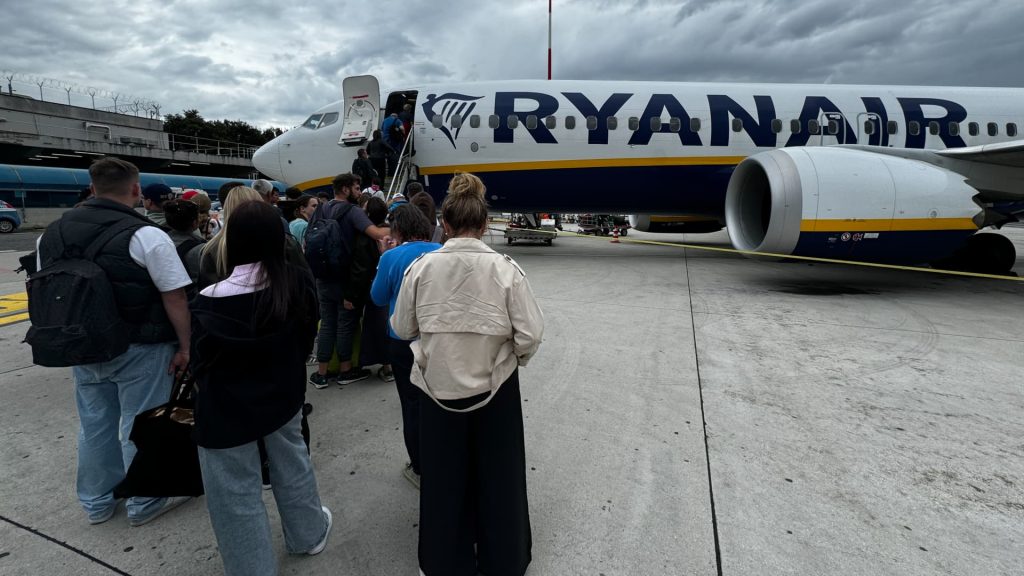As the travel industry gears up for peak season, airlines are grappling with significant delivery delays from major aircraft manufacturers, notably Boeing and Airbus. These setbacks are leading to growing concerns over a commercial jet shortage despite positive demand forecasts for summer travel. Experts and industry leaders, including Kenton Jarvis, CEO of EasyJet, emphasize that the capacity constraints could impact performance in the upcoming months, even as optimistic booking trends continue.
| Article Subheadings |
|---|
| 1) Airlines Confront Delivery Delays |
| 2) EasyJet’s Financial Landscape |
| 3) Capacity Constraints and Market Demand |
| 4) Recent Improvements in Aircraft Deliveries |
| 5) The Broader Outlook for Aviation |
Airlines Confront Delivery Delays
This summer season, airlines are facing unprecedented challenges due to delays in aircraft deliveries from Boeing and Airbus, which are negatively impacting their operational capacity. Specifically, both companies have struggled to meet their original delivery schedules, leading to a noticeable shortage of commercial jets for airlines. While demand for air travel is on the rise, these constraints threaten to hinder fleet expansions and capacity increases. Within this context, industry leaders are voicing their concerns about the implications of these delays on their overall performance.
EasyJet’s Financial Landscape
In direct relation to these delivery challenges, EasyJet recently posted a pre-tax loss amounting to £394 million (approximately $529 million) for the first half of the year, compared to a lesser loss of £350 million during the same period in 2024. Despite these losses, Kenton Jarvis remains optimistic, citing robust demand for summer travel. According to him, current bookings suggest that the airline may well meet its full-year profit expectations. Yet, investor sentiment appears muted, as evidenced by a 4% dip in the company’s stock price shortly after the earnings report was released.
Capacity Constraints and Market Demand
Looking ahead, Kenton Jarvis has identified the timely delivery of aircraft as crucial to navigating current market demands. He stated that the lack of timely deliveries from both Boeing and Airbus has resulted in only modest increases in airline capacity, suggesting that while demand is robust, the supply constraints will limit airlines’ operational capabilities during peak travel times. In fact, capacity increases are projected at merely 1% to 3% this summer, a stark contrast to the vibrant demand conditions that exist. Aviation experts have warned that these delivery delays could extend for years, complicating the overall capacity equation for airlines.
Recent Improvements in Aircraft Deliveries
Despite the challenges, there are early indications of improvement in aircraft deliveries. Boeing reported a significant uptick, delivering 45 commercial jets in April, nearly double what it had achieved during the same month last year. This uptick suggests that the aircraft manufacturer is beginning to stabilize its production issues, demonstrating a potential recovery path in the near future. In contrast, Airbus delivered 56 jets in the same period, reflecting an 8% decline compared to previous year’s figures. This uneven performance across both manufacturers presents a mixed bag for airlines as they navigate the fluctuating market landscape.
The Broader Outlook for Aviation
Optimism regarding the future of the airline sector remains, as noted by Michael O’Leary, CEO of Ryanair, who recently expressed his belief that demand would remain strong this summer due to favorable pricing conditions. O’Leary highlights that decreasing oil prices could provide a vital “tailwind” for the airline industry, potentially aiding financial recovery and emphasizing the potential for increased travel enthusiasm among consumers. The aggregation of these insights forms a complex narrative about the outlook for the aviation industry in the face of significant operational hurdles.
| No. | Key Points |
|---|---|
| 1 | Airlines are experiencing significant aircraft delivery delays from Boeing and Airbus. |
| 2 | Despite posting a loss, EasyJet has robust summer booking forecasts. |
| 3 | A capacity increase of 1-3% is expected this summer, limiting operational capabilities amidst high demand. |
| 4 | Recent improvements in jet deliveries have been reported by Boeing. |
| 5 | Declining oil prices may provide a favorable environment for the revival of the airline sector. |
Summary
In conclusion, the airline industry is at a critical juncture as it approaches the peak travel season. While demand for air travel is encouraging, significant delivery delays from aircraft manufacturers pose substantial challenges for operational scalability. With industry leaders expressing cautious optimism tempered by financial realities, it is clear that airlines must navigate a complex matrix of supply, demand, and external factors to successfully adapt and thrive.
Frequently Asked Questions
Question: What challenges are airlines facing this summer?
Airlines are grappling with significant delivery delays from major manufacturers such as Boeing and Airbus, which are leading to a shortage of commercial jets.
Question: How is EasyJet performing financially?
EasyJet reported a pre-tax loss of £394 million for the first half of the year but remains optimistic about summer bookings, suggesting they may meet full-year profit expectations.
Question: What is the expected capacity increase for airlines this summer?
Airlines are projecting only modest capacity increases of 1% to 3% this summer due to delivery constraints, despite high demand for air travel.
